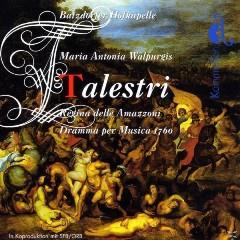Maria Antonia Walpurgis (E.T.P.A.) - Talestri, Regina delle Amazzoni (1998)
Maria Antonia Walpurgis (E.T.P.A.) - Talestri, Regina delle Amazzoni (1998)

Ouverture 1 Sinfonia: Allegro 2:22 2 Sinfonia: Andantino 1:53 3 Sinfonia: Allegro 1:44 Act I 4 Aria: Vado: Ma Il Core Oh Dio! 4:03 5 Recitativo: La Sgrido, E Anch'io Già Sento 0:49 6 Aria: Chi Main Non Partì Dal Lido 5:02 7 Coro: Dea De'broschi; Arciera Diva 2:14 8 Aria: Non mi lagno del mio fato 3:05 9 Marcia 1:40 10 Recitativo: Olà! Ti Sdegni! 0:55 11 Aria: Ad Abbracciar L'amico 6:44 Act II 12 Recitativo: Regina! ... Ostia Novella 1:42 13 Aria: Pensa, Che Ancore Io Passo 3:31 14 Aria: Io di Quel Sangue ò Sete 2:52 15 Recitativo: Parlò, Tomiri ? 1:33 16 Coro: "Mora L'amante Audace 0:34 17 Recitativo: Inumane! Idol Mio! 0:27 18 Duetto: Ah Mi Divide Il Seno 5:56 Act III 19 Aria: Da Me Ti Divide 4:18 20 Aria: Sempre M'avrai Sul Ciglio 5:16 21 Recitativo: Dove Son? Che M'avvenne? 3:14 22 Aria: Pallid'ombra, che d'intorno 6:22 23 Recitativo: Ed Io Rimango? 0:26 24 Marcia 1:59 25 Recitativo: Compagni Più Non Vive 2:45 26 Coro: Esser Gloria In Voi Non Deve 1:44 Talestri - Jana Frey Antiope - Jeanne Pascale Schulze Oronte - Gerzon Luiz Sales Learco - Oleg Bezinskikh Tomiri - Cassandra Hoffman Choir of the Amazones: Jacqueline Krohne, Bettina Ruhle, sopranos Anneka Ulmer, alto Choir of the Skythians: Alexander Schneider, countertenor Sebastion Herborn, tenor Ingolf Seidel, bass Batzdorfer Hofkapelle Daniel Deuter - director rec. VIII, 1998, Cuvilliés-Theater, München
Maria Antonia Walpurgis (ETPA), Princess of Bavaria and Electress of Saxony, was born in Munich to Archduchess Maria Amalia of Austria and Emperor Karl VII. Well-educated from a young age, her musical studies with talented composers, Nicolas Porpora and Johann Adolph Hasse, continued even after she married Friedrich Christian in 1747. Walpurgis frequently sang and played harpsichord at court and was also a painter and a writer of poetry. She composed two operas set to her own texts, Il trionfo della fedeltà (1754) and Talestri, regina delle amazzoni (1765), singing the leading role in both operas. These scores were published by Breitkopf and performed throughout Europe. Because she was a member of the Arcadian Academy of Rome, Maria Antonia’s publishing pseudonym was E.T.P.A (Ermelinda Talea Pastorella Arcadia). Her encouragement of other musicians and composers and her contributions to musical life sealed her legacy as both a respected composer and a fervent patron of the arts. ---amodernreveal.com
The Enlightenment witnessed the rise of a public whose role as sovereign arbiter of operatic taste irreversibly changed the processes by which fame and renown were bestowed upon composers. The public sphere – a conceptual space in which texts (including music) were disseminated and debated – emerged as an expansive intellectual forum in which composers, performers and works could be evaluated. In spite of opera's long-standing association with fame and renown, its role in the processes leading to ascriptions of musical value and fame in the Enlightenment public sphere is a significant dimension of canon formation that has yet to be fully investigated. This article offers a case study of Electress Maria Antonia of Saxony (1728–1780), whose mutually beneficial relationship with the Breitkopf firm, coupled with its redesigned ‘movable type’ in 1755, prompted a new mode of opera criticism, one that focused sharply on the music itself. Maria Antonia's Il trionfo della fedeltà (1754) and Talestri (1762) were the first operas to receive reviews featuring in-text musical examples, fuelling the public's quest to monumentalise Maria Antonia as celebrated composer. Ultimately, the inclusion of musical excerpts in opera criticism was an important step toward the construct of the work as separate from individual localised performances. ---cambridge.org
download (mp3 @320 kbs):
yandex mediafire ulozto gett bayfiles








